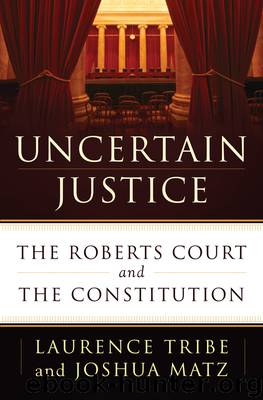Uncertain Justice by Laurence Tribe

Author:Laurence Tribe
Language: eng
Format: epub
ISBN: 9780805099133
Publisher: Henry Holt and Co.
7
PRIVACY: WHAT HAVE YOU GOT TO HIDE?
“Nine scorpions in a bottle.”1
This classic description of the Court in the mid-twentieth century—borrowed by a recent biographer2—is singularly apt. As America spun from crisis to crisis in the years after World War II, its highest court stood fractured by bitter personal rivalries, ideological conflict, and political maneuvering. In 1953, when Chief Justice Fred Vinson died halfway through stalled deliberations in Brown v. Board of Education, leaving open a seat soon filled by Earl Warren, Justice Felix Frankfurter confided that Vinson’s passing was “the first solid piece of evidence I’ve ever had that there really is a God.”3 Thrown together by the politics of appointments, the midcentury justices seethed and struggled inside the Marble Palace. Scorpions, indeed.
Ours is an age of comparative harmony. Justice Kagan won immediate goodwill on the Court by acquiring a frozen yogurt machine, and she now jokes that she will forever be remembered as “the frozen yogurt justice.”4 When Justice Alito first arrived, Justice Breyer arranged a celebratory dinner and invited a special guest from Alito’s hometown baseball team.5 “He opened the door,” Alito recalls, “and the Phillie Phanatic came in and gave me a big hug. And it was great.” Justice Ginsburg, soft-spoken and steely, is famously close with brash and wisecracking Justice Scalia—a friendship grounded in their love of opera and shared sense of humor. As Ginsburg fondly admits, Scalia “is one of the few people in the world who can make me laugh.”6
Still, the Roberts Court isn’t all flowers and hugs. The justices may be friendly, but they are also fierce and competitive participants in a struggle to define the Constitution. Each was carefully chosen by a president who sought a gladiator to champion particular ideals, whether through sheer force of intellect or the subtler arts of persuasion. Collegiality and compromise enjoy an important role on the Court, but it is ultimately a limited one. A shifting matrix of alliances, betrayals, and bitter defeats quickly teaches new arrivals that no vote can ever be taken for granted. Although ours is not an age of scorpions, the Court is still rife with intrigue and power struggles.
That drama unfolds awkwardly in a semitransparent institution. The image of scorpions in a bottle evokes both painful claustrophobia and an intrusive public eye, and in this way the metaphor applies to every era of the Court. In our Internet age more than ever, though, the justices carefully calibrate how much information they willingly reveal to outsiders. Some of these safeguards reflect principles of fairness: it wouldn’t do to permit anyone to profit politically or financially by obtaining advance notice of how cases will be decided. Other policies protect the integrity of the Court’s deliberative process: if the first round of tentative votes were announced, or if all deliberations were thrown open to the public, the justices might feel less willing to speak freely or change their minds. Still other privacy rules are meant to protect the Court’s reputation and the justices’ personal lives.
Download
This site does not store any files on its server. We only index and link to content provided by other sites. Please contact the content providers to delete copyright contents if any and email us, we'll remove relevant links or contents immediately.
Day by Elie Wiesel(2775)
The Age of Genius by A. C. Grayling(2571)
Gideon's Spies: The Secret History of the Mossad by Gordon Thomas(2330)
The Gulag Archipelago (Vintage Classics) by Aleksandr Solzhenitsyn(2078)
FATWA: Hunted in America by Pamela Geller(1993)
Columbine by Dave Cullen(1859)
Men Explain Things to Me by Rebecca Solnit(1717)
The Rule of Law by Bingham Tom(1679)
Anatomy of Injustice by Raymond Bonner(1654)
Examples & Explanations: Administrative Law by William F. Funk & Richard H. Seamon(1631)
Three Cups of Tea by Greg Mortenson(1606)
The Source by James A. Michener(1598)
That Every Man Be Armed by Stephen P. Halbrook(1575)
ADHD on Trial by Michael Gordon(1568)
Future Design by Unknown(1562)
Gideon's Spies by Gordon Thomas(1497)
Palestinian Walks by Raja Shehadeh(1494)
Constitutional Theory by Carl Schmitt(1447)
Nothing to Envy by Barbara Demick(1439)
